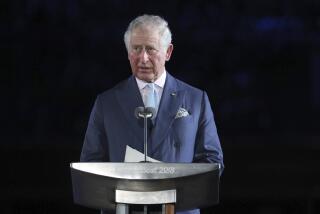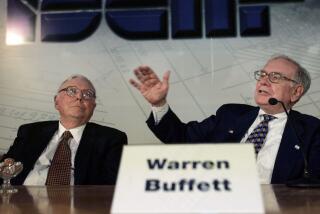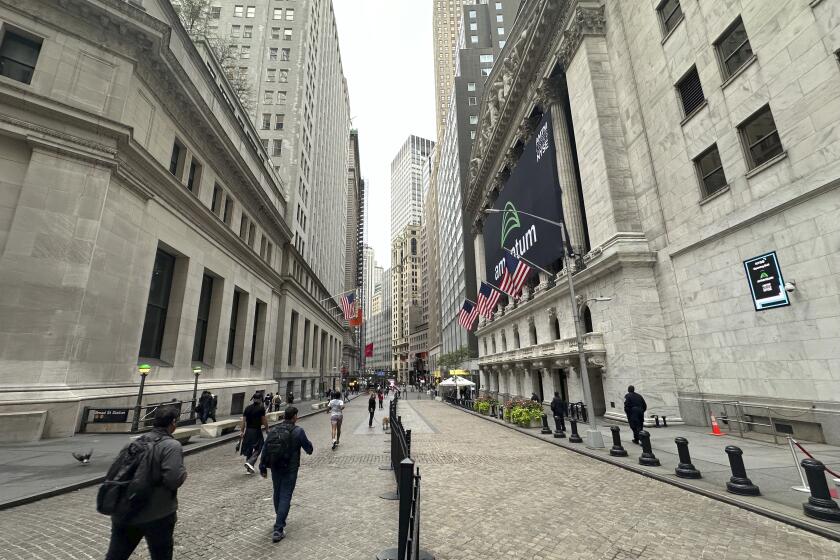Warren Buffett cancer diagnosis adds pressure to name successor
Warren Buffett’s disclosure that he has prostate cancer will intensify the pressure on the famed investor to publicly reveal the name of the executive he has chosen to succeed him at the helm of Berkshire Hathaway Inc.
Berkshire announced Tuesday that the 81-year-old Buffett has Stage 1 prostate cancer and will begin radiation treatments in mid-July. It is considered to be the mildest form of prostate cancer, with doctors simply monitoring the normally slow-growing tumors to ensure patient conditions don’t worsen.
“I’ve been told by my doctors that my condition is not remotely life-threatening or even debilitating in any meaningful way,” Buffett wrote in a letter to shareholders posted on Berkshire’s website. “I feel great — as if I were in my normal excellent health — and my energy level is 100%.”
Still, the announcement is likely to ramp up speculation over whom Buffett has picked to be his eventual successor.
Buffett revealed in his annual letter to shareholders in February that he had chosen an heir apparent and gotten approval for that person from Berkshire’s board of directors. But in an unusual twist apparently designed to shield the would-be successor from a media blitzkrieg, Buffett refused to publicly reveal the name of the executive — and hasn’t even notified the person.
Among the likely contenders, according to analysts, is Ajit Jain, a longtime Berkshire employee who now runs the company’s reinsurance business. Another possibility is Tony Nicely, the chief of Berkshire’s Geico unit. Others include the heads of several of the conglomerate’s businesses, including Burlington Northern chief Matthew Rose and MidAmerican Energy Holdings chief Gregory Abel.
The cancer diagnosis will put pressure on Buffett to reveal the person’s name.
“One of the biggest drags on the stock have been questions about succession,” said Joe Magyer, a senior analyst at the Motley Fool. “This definitely pours gasoline on the fire. Even if Buffett comes out perfectly healthy, it’s going to be a monkey on the back of the stock for a long time.”
Berkshire stock fell briefly when the announcement was made at the close of the stock market, but it recovered in after-hours trading. Berkshire’s B shares closed at $80.76 in regular trading, up $1.09.
Shares have lagged in recent years, prompting Berkshire to launch its first-ever buyback program last year.
Some analysts said Buffett’s strong odds of survival will limit any damage to Berkshire stock.
“It does remind people that he’s mortal, but this is not a Steve Jobs situation,” hedge fund manager Jeff Matthews said in reference to the visionary co-founder of Apple Inc. who died in October.
Buffett’s health will add a serious tone to Berkshire’s shareholder meeting May 5.
The meetings are normally celebratory affairs — annual rituals that have been dubbed the Woodstock of Capitalism, but actually are closer to an apotheosis of Buffett himself. As many as 40,000 admirers descend on Omaha to snap photos with their hero, eat at his favorite steakhouse and buy trinkets at a Berkshire-owned jewelry store.
This year, investors will closely scrutinize Buffett’s behavior for clues to his condition.
“How Buffett handles himself that day will have a big impact on investor sentiment and reaction,” Magyer said. “If he shows himself to be the Warren we all know and love, with tons of energy and sharp as a razor, then investors will walk out feeling very confident and relieved.”
“But if they see someone struggling, it’s going to be tough for investors to swallow, both from a dollars-and-cents standpoint and from a personal perspective,” he said.
Aside from his role at Berkshire, Buffett in recent years has waded deeply into the national debate over issues such as how much wealthy Americans pay in taxes.
Last year, Buffett wrote a newspaper op-ed article decrying that he pays a lower tax rate than his secretary, largely because the bulk of his income stems from investments rather than earnings. The issue has become a polarizing one in this year’s presidential election.
The Obama administration crafted a proposed “Buffett rule” that would require Americans who earn $2 million or more in taxable income to pay at least 30% in federal taxes. Similar “millionaires’ taxes” have been proposed in California and elsewhere.
A Gallup poll Friday found that six in 10 Americans favor the Buffett rule, but Republicans blocked the measure in a Senate filibuster Monday.
Buffett said he doesn’t expect to step back from the national stage after getting the diagnosis. In fact, the billionaire investor said in a shareholder letter that he expects to be around a long time.
“I will let shareholders know immediately should my health situation change,” he wrote. “Eventually, of course, it will; but I believe that day is a long way off.”
Times staff writers Joe Bel Bruno and Tiffany Hsu and special correspondent Thomas H. Maugh II contributed to this report.
More to Read
Inside the business of entertainment
The Wide Shot brings you news, analysis and insights on everything from streaming wars to production — and what it all means for the future.
You may occasionally receive promotional content from the Los Angeles Times.










